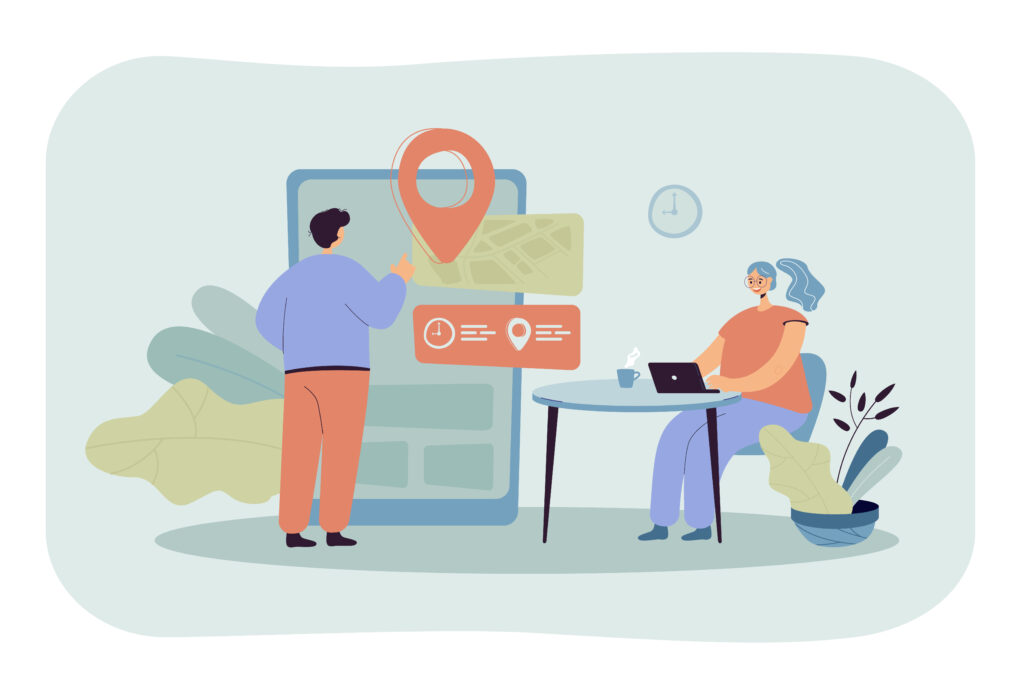Ever notice some local businesses always top search results, while others stay hidden? With 46% of Google searches being local, it’s all about local search engine optimization. For small businesses, knowing local SEO tactics is key. They help you get noticed by nearby customers who are ready to buy. This guide will show you how to boost your local search ranking. From improving your business listings to using Google My Business well, you’ll learn it all. These strategies can boost the number of people finding your website through local searches.
Key Takeaways
- Local search accounts for 46% of Google searches, underlining the need for optimized local SEO tactics.
- Optimizing local business listings make you more visible and attracts nearby, purchase-ready customers.
- An effective Google My Business profile is critical for local search engine optimization.
- Keeping your NAP (Name, Address, Phone number) information consistent across platforms is essential.
- Getting involved with the local community on social media can enhance your local SEO efforts.
What is Local SEO?
Local SEO helps businesses show up more in online searches within a specific area. It’s key for shops and offices aiming to attract nearby customers. This method uses local content marketing and focuses on local keyword research. It helps businesses become the top choice in their neighborhoods.
Definition of Local SEO
Local SEO uses strategies to improve how businesses show up in local searches. These include improving business listings, creating local website content, and getting cited online. It mixes local content marketing and technical SEO. This blend strengthens a business’s spot in online local searches.
Importance of Local SEO for Businesses
Local SEO is incredibly important for businesses. It ensures they are seen by local customers ready to buy. Without it, even local businesses may not show up in searches. This is why local keyword research is key. It helps businesses know what their customers search for locally, improving their SEO tactics.
Benefits of Local Search Optimization
Optimizing for local search can help businesses attract nearby customers. It makes sure your business info is seen by locals. This can greatly boost your success in serving the community.
Increased Online Visibility
By using Google My Business and focusing on ‘near me’ searches, your business can be seen more online. When users look for services close by, your business stands out. This makes it more likely for them to choose you for their needs.
Higher Local Search Rankings
Focusing on local search can boost your business’s ranking in local search results. When you optimize your Google My Business and connect with the local area, it helps search engines see you more. This way, more people can find your business easily.
Attracting More Local Customers
Getting optimized for local search can draw in more local customers. Being part of ‘near me’ searches connects you with those looking to buy. Plus, by getting involved in local efforts, your appeal and trust grow, encouraging people to choose you.

How to Optimize for Google My Business
Getting your Google My Business profile right is key for local search results. Let’s guide you through setting up local citations and making your Google My Business profile work for you.
Setting Up and Verifying Your Google My Business Profile
Start by creating your Google My Business profile on their site. Then, make sure to update all your business info, such as your name, address, and phone. It’s vital to keep this info the same everywhere. Verify your account through a phone call, an email, or by getting a postcard at your business address.
Optimizing Your Google My Business Listing
Once you’re verified, enhance your listing. Add photos and make sure your hours are up to date. A good description of your business can draw in customers. Pick the right categories to make your business easier to find. An optimized profile is a big plus for your Google My Business page.
Leveraging Customer Reviews
Reviews really matter. Ask happy customers to leave positive feedback. Respond to all reviews to show you care. This can improve how you show up in local searches. Keeping an eye on your reviews is crucial for a good local image.
Follow these steps to set up your profile, make it better, and handle reviews. You can use local citations and Google My Business to really boost your business’s visibility.

The Role of NAP Consistency
Keeping NAP the same on all local listings helps in local SEO. NAP means Name, Address, and Phone number. Making this info consistent boosts how well you show up in search results.
What is NAP?
NAP is a business’s Name, Address, and Phone number. It’s really important for a business to keep NAP info the same everywhere online. This includes listings, social media, and directories.
Importance of Consistent NAP Information
Having the same NAP across platforms helps search engines trust your business. This trust makes search engines show your site more. If your NAP is different in various places, search engines and customers get confused. This can hurt your business by lowering your search result rankings.
Best Practices for NAP Consistency
There are some best practices to follow for NAP consistency.
- Uniformity: Keep your NAP the same on all websites, local listings, and social media.
- Crawlability: Make sure search engines can read your NAP info by not using images or JavaScript for it.
- Prominence: Put your NAP in important parts of your site, like the header, footer, or contact page.
Following these practices will help your business show up better in search results and provide accurate details to customers.
| Platform | Practice | Impact |
|---|---|---|
| Website | Include NAP in header/footer | Improved crawlability |
| Directories | Keep uniform NAP details | Enhanced search engine visibility |
| Social Media | Consistent NAP info | Trust and credibility |

Optimizing Online Directories and Citations
It’s crucial to keep online directories and citations up to date for strong local SEO. These listings are like doors that lead customers to businesses. Checking local SEO with an audit makes sure all details are right everywhere.
Mistakes like wrong spellings, old addresses, or phones can throw search engines off. This drops a business’s rank in searches. So, keeping directories optimized means always checking and correcting this info.
Local citations boost a business in local search results by featuring its NAP info on different sites. A key tactic to keep these mentions consistent is simplicity:
- Keep your NAP info up to date on all directories.
- Use tools that update changes as they happen.
- Make sure each listing uses the right categories and keywords.
- Act quickly on customer alerts about wrong details.
Following this advice, companies can avoid mix-ups and boost their local visibility. Remember, an accurate online business profile everywhere is essential for local search success. Regular local SEO audits maintain this accuracy, keeping companies appealing to search engines and customers.
Conducting a Local SEO Audit
Doing a local SEO audit is key for figuring out what’s working and what’s not in your strategy. We will look at important parts to make sure your business does well in local searches.
Google My Business Audit
Begin with checking your Google My Business profile. Make sure all details are right and up to date. This means the name of your business, where it is, phone number, and hours of operation. Keeping this profile fresh helps more people find you in local searches.
Google Search Console Audit
Then, dive into your Google Search Console data. This step can catch crawling and indexing mistakes. Fixing these helps your local content shine more. Always look out for and mend any errors to keep your online image strong.
On-Page SEO Audit
Looking at on-page SEO helps each of your web pages do better in local searches. Use the right local keywords and make sure your titles and descriptions are top-notch. Doing this makes your site more relevant and boosts your local links.
Citation Audit
Reviewing your citations makes sure your business info is the same everywhere online. Mistakes in these listings can confuse search engines and hurt your local search rank. So, check and fix these to make your listings strong.
Competitor Analysis
Take a look at what your competition is doing in local SEO. This can show you what works and what doesn’t. Then, use these insights to make your strategy even better and beat the competition.
| Audit Type | Key Actions | Benefits |
|---|---|---|
| Google My Business Audit | Verify and update business information regularly. | Increased visibility in local business listings. |
| Google Search Console Audit | Fix crawl errors and indexing issues. | Improved site crawlability and performance in local searches. |
| On-Page SEO Audit | Optimize content with local keywords and meta tags. | Enhanced relevancy and local search rankings. |
| Citation Audit | Ensure NAP consistency across all directories. | Accurate information boosts search engine trust. |
| Competitor Analysis | Study competitors’ strategies and tactics. | Gain insights for improved local SEO tactics. |
Creating and Optimizing Local Content
Producing content that interests your local audience is key. Let’s look at how to do this effectively. We’ll discuss various strategies for creating and enhancing local content.
Local Content Ideas
Think about what makes your area special to locals. Focus on things like:
- Local events and community highlights
- Spotlights on local businesses and personalities
- Guides related to your area, such as dining or outdoor activities
Using Local Keywords
Doing local keyword research helps your content find its audience. Find out what people in your area search for. Then, naturally include these terms in your content. This helps your content rank better in local searches.
| Local Keyword | Search Volume | Relevance |
|---|---|---|
| Best pizza in Boston | 1,500 | High |
| Events in Austin today | 2,000 | High |
| Top attractions in Chicago | 1,200 | Medium |
Content Marketing Tips for Local SEO
Good content marketing boosts your site’s local SEO. Here are some tips:
- Sharing local customer success stories helps you connect and build trust.
- Make sure your content is friendly to mobile users. Mobile searches are growing fast.
- Update content regularly to keep up with what’s happening in your area.
With a strong local content strategy, your content will stand out. You’ll create material that your audience truly enjoys, boosting your SEO locally.
Building Local Links
Creating links locally is very essential. It helps businesses become more visible in searches locally. By connecting within the local community, a company shows it is an authority in the area to both people and search engines.
Importance of Local Link Building
Getting local backlinks is crucial for several reasons. In SEO, links are still very important. They share authority and increase the flow of visitors to your site. For local businesses, these links are even more useful. They make the business more likely to show up in local searches. They also show the community that the business matters and can be trusted. Therefore, creating these links greatly affects local SEO efforts.
Did you know 77% of people check reviews first? This means if your business has backlinks from trusted local sources, like news outlets or blogs, it can build more trust. This could make more people choose your services.
Strategies for Earning Local Backlinks
For good backlinks, businesses should use smart local SEO plans. Here are some top strategies:
- Engage with Local Businesses: Work with businesses near you to swap backlinks for mutual benefit.
- Sponsor Local Events: Supporting events in your community can get you links from the event’s site or news coverage.
- Participate in Community Initiatives: Helping out in local charities can bring you links from their sites.
- Host Local Events or Webinars: Putting on events can get you backlinks from attendees or local bloggers.
Also, putting Local Business Schema on your website is a good move. It makes it easier for search engines to understand your site’s localized content. This improves user experience and site performance, which are both key for ranking. If you have more than one location, consider unique local content for each to boost overall SEO.
Building local links takes steady community involvement and a sharp eye for opportunities. This work helps make your local SEO strong, which can lead to higher search rankings and attract more local clients to your business.
Enhancing Mobile Friendliness
To reach more people, it’s key to focus on mobile optimization. A big share of local searches comes from mobile phones. So, it’s crucial for businesses to make sure their mobile experience is top-notch. I’ll talk about some important points below.
Why Mobile Optimization is Crucial
Today, it’s all about how easy your site is to use on a phone. Making your site easy to use on mobile can improve how well people can find and use your site. And it also helps your business rank better in local searches. A great mobile site can turn visitors into loyal customers.
Tips for Improving Mobile Experience
To get the best mobile experience for local searches, your site needs to work great on phones. Here’s how:
- Design a responsive website: Your site should change to look good on any phone screen.
- Streamline navigation: Make menus simple and clear so people can easily find what they need.
- Optimize load times: Cut down on load times by making your site’s files smaller and using quick hosting services.
By following these tips, your business can really stand out to customers. A well-optimized mobile site meets the instant needs of users, improving your business’s local search rankings and attracting more local visitors.
How to Optimize for Local Search
Optimizing for local search demands a smart use of content and site design. By following specific local SEO strategies, businesses can boost their appearance in search results. This helps draw in the right local audience.
Integrating Local Keywords
Adding local keywords to your website’s content is key. These terms should show where you are and what you do. If you have a bakery in Austin, you’d use phrases like “Austin bakery” or “fresh bread in Austin”. Such keywords tell search engines you’re relevant locally, helping you rank higher in local searches.
Optimizing Meta Descriptions and Title Tags
It’s also important to tweak meta descriptions and title tags with local keywords. Meta descriptions give a sneak peek of your page in search results. Title tags are the headlines people click on. By using local terms, you make sure both search engines and users understand your local touch right away. For example, a meta description for your bakery might say, “Taste the freshness at our Austin bakery. Come by for some local bread love!” This approach attracts nearby customers and boosts your local search visibility.
Leveraging Schema Markup for Local SEO
Schema markup helps search engines grasp your content better. It gives them more data to show in search results. For local search, it lets you share detailed info about your business directly. That can include your address, phone number, and business hours. This extra information makes your listing more appealing and trustworthy. It can also improve how search results show your business, drawing in more local visitors.
Conclusion
Local search engine optimization involves several key steps. This includes focusing on Google My Business, creating great local content, and making sure your website works well on phones. By doing this, businesses can boost how high they show up in local searches.
By following these steps, businesses become more visible to people nearby. This means more local customers may choose to use their services or products. It’s all about being known and trusted in your local area.
In this guide, I’ve laid out the main strategies for local SEO success. Prioritize your Google My Business page, use the right keywords, and keep your name, address, and phone number info consistent online. Doing these things can help your business grow and stand out locally. Follow these tips, and you may see real benefits from your local SEO work.
